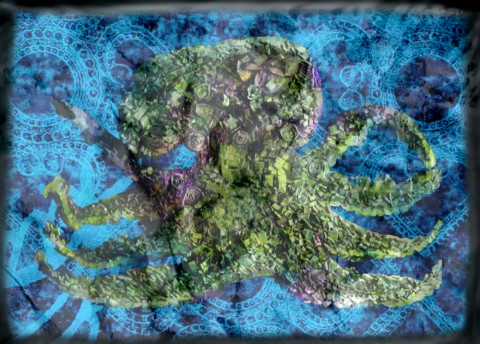Her papa’s hands tremble as he opens the olives—something she can do but asks for help with anyway. It is the same sort of lid the octopus she is studying in her lab opens to dig for shrimp while she clicks the buttons on her stopwatch. In a race, Papa would shake into second, the octopus leaving him far behind. Slow to leave the table where he chops this morning’s catch, slow to take the jar, slow and fumbling as he turns the lid.
Her hand in a loose fist, she presses her thumb against an imaginary button, counts, pushes again. Yes, slower. Tomorrow, when she feeds her octopus scraps from his fishing nets, its time will be shorter than the day before. Every day, the octopus gets faster.
It is as if every second lost at home is one gained in the lab.
Still, Papa’s fast enough to have caught them dinner: the pulpo from the first cast of the day. Another octopus, but in his nets, in this house, on his tongue that still struggles with English, it is always “pulpo.”
She stays at work too long, wants to be back now. Her octopus’s spots have grown familiar, like a face.
She is not lonely there, at work.
She waits for the sound of the pulpo hitting oil, waits for the smell. Feels Papa’s hand swim across her shoulder as he maneuvers around her.
When it comes, the smell is the same as it has always been. Olive oil, garlic, the tart of a lemon cut, cut again. The salt and brine on his clothes, in the curtains, the smell of fish from his nets, her necropsies settled deep in the wood.
The house will remember even as he forgets. Even if they both forget.
She steals an olive from his cutting board, like a second from the stopwatch, and then a slice of pulpo, sizzling, from the pan. He pops her knuckles, wags his father finger with a smile: “Wait.”
Still fast enough for that, too.

Notes from Guest Reader Elisabeth Hamilton
I chose ‘Pulpo’ because it was both strange and familiar to me. I’ve never cooked octopus, or seen one in a lab, but the story still felt like something I recognized. It seems to me a story about memory, and how we remember and forget things, what we remember and forget, and the form mimics this experience. It’s full of ghosts–I loved the line about the house remembering, even if both the father and the child forget. The story packs a lot in so little space, and I was impressed by its layers.


 The SmokeLong Grand Micro Contest (The Mikey) is now an annual competition celebrating and compensating the best micro fiction and nonfiction online.
The SmokeLong Grand Micro Contest (The Mikey) is now an annual competition celebrating and compensating the best micro fiction and nonfiction online.